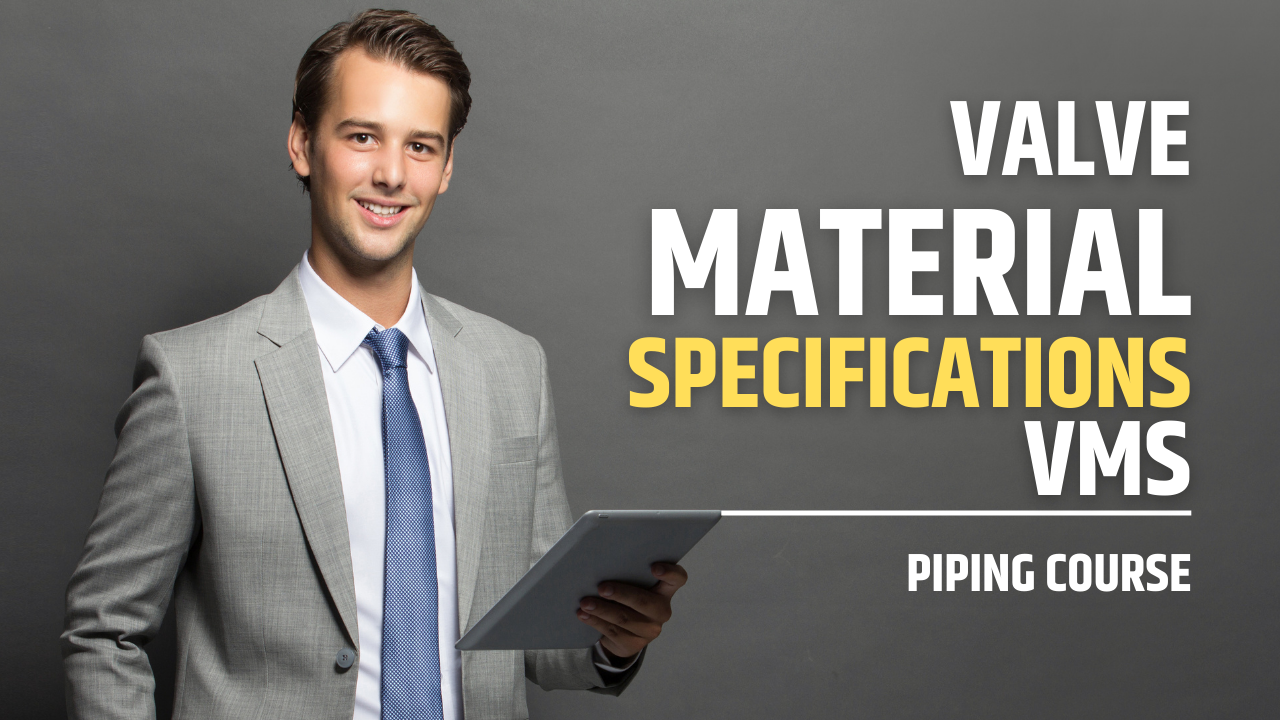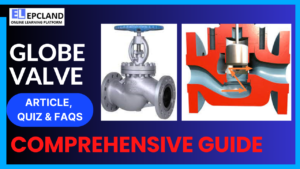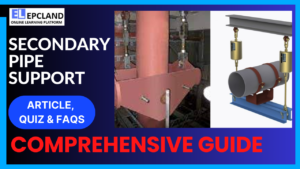Piping engineers play a critical role in the design and operation of industrial piping systems. The accurate selection, design, and specification of valves are paramount to the safety and efficiency of these systems. Our Valve Material Specification (VMS) course is designed exclusively for piping engineers, providing an in-depth exploration of the intricacies involved in valve material specifications for industrial applications. Here’s a breakdown of the course sections and what you can expect to gain:
By EPCLand.com
Scope:
Understand the foundational scope and objectives of the VMS course. Delve into the reasons why proper valve selection and material specifications are vital for ensuring safe and efficient piping system operations.
Table of Contents
Abbreviation:
Get familiar with industry-specific abbreviations and acronyms that are crucial in valve material specifications. Enhance your grasp of the specialized terminology used in valve engineering.
Reference Documents:
Immerse yourself in the vital reference documents that form the basis for valve material specifications. Gain insights into industry codes, standards, and guidelines that are indispensable for selecting suitable valves for specific applications.
Valve Numbering System:
Discover the significance of the valve numbering system in identification and traceability. Learn how this system aids in efficient valve management throughout the lifecycle of a piping system.
General Notes:
Comprehend the importance of incorporating specific instructions, requirements, and limitations in the general notes of valve material specifications. Ensure precision in valve selection and procurement by including critical details.
Attachments:
Learn about the role attachments play in valve material specifications. Master the interpretation and utilization of drawings, diagrams, and technical datasheets to enhance your specification process.
Valve Index:
Appreciate the importance of valve indexing in record-keeping, maintenance, and system operations. Gain an understanding of how valve indexing functions within valve material specifications.
Valve Datasheets:
Develop expertise in reading, interpreting, and creating valve datasheets. Understand the key parameters to consider when selecting valves based on specifications, materials, and performance characteristics.
Inspection Requirements:
Grasp the significance of inspection requirements in ensuring compliance with specifications, standards, and quality assurance. Familiarize yourself with testing and inspection methods during valve procurement and fabrication.
Material Section of Valves:
Dive deep into valve materials (ASTM Standards), exploring selection criteria for different materials like carbon steel, low-temperature carbon steel, stainless steel, and high-temperature carbon steel. Understand relevant ASTM standards for each material type.
Anatomy of Gate Valves:
Explore the anatomy of gate valves according to API standards. Enhance your understanding of gate valves and their components, including the 17 components specified by API 600, 58 components specified by API 602, and 14 components specified by API 6D and API 6A.
API Standards:
Uncover the API standards relevant to valve material specifications, such as API 600 and API 6D. Grasp the requirements and guidelines outlined in these standards for proper valve selection and material specifications.
Valve Trims and Non-Trims:
Learn the material selection criteria for valve trims and non-trims. Understand the significance of selecting appropriate materials for valve internals to achieve optimal performance and durability.
Trims and Non-Trims Identifications:
Master the methods and markings used to identify valve trims and non-trims. Interpret and recognize different trim materials based on industry standards.
Information Sources and Sequences:
Gain insights into various information sources available for valve material specifications. Understand the sequence of steps to extract relevant clauses and tables from API standards and reference documents.
Embark on the Valve Material Specification (VMS) course and emerge equipped with the knowledge and skills to effectively create, interpret, and implement valve material specifications as a proficient piping engineer.
FAQs:
Q1: Who is the Valve Material Specification (VMS) course tailored for?
A1: The VMS course is designed specifically for piping engineers involved in valve selection, design, and material specifications for industrial applications.
Q2: What will I learn in the course’s “Valve Datasheets” section?
A2: In the “Valve Datasheets” section, you’ll master the art of reading, interpreting, and creating valve datasheets. You’ll understand the crucial parameters for valve selection based on specifications, materials, and performance characteristics.
Q3: How does the valve numbering system contribute to efficient valve management?
A3: The valve numbering system aids in valve identification and traceability throughout the lifecycle of a piping system, facilitating streamlined valve management and maintenance activities.
Q4: What API standards are covered in the course?
A4: The course covers relevant API standards, including API 600 and API 6D. These standards provide essential guidelines for proper valve selection and material specifications.
Q5: Why is understanding valve indexing important?
A5: Valve indexing is vital for accurate record-keeping, maintenance, and smooth system operations. It ensures clear identification of valves and their specifications.
Q6: What is the significance of attachments in valve material specifications?
A6: Attachments, such as drawings, diagrams, and technical datasheets, play a crucial role in enhancing valve material specifications by providing visual and technical information.
Q7: How will the course enhance my understanding of valve trims and non-trims?
A7: The course will provide you with material selection criteria for valve trims and non-trims, helping you choose the right materials for optimal valve performance and durability.
Q8: What can I expect to learn about gate valves in the course?
A8: The course covers the anatomy of gate valves according to API standards. You’ll gain insight into the components specified by different API standards, enhancing your understanding of gate valves.
Q9: How will the course help me interpret industry-specific abbreviations?
A9: The “Abbreviation” section of the course will familiarize you with relevant industry abbreviations and acronyms, aiding your comprehension of terminology in valve engineering.
Q10: How can I access the Valve Material Specification (VMS) course?
A10: You can access the VMS course through our platform. Visit our website to learn more about registration and enrollment details.
Recommended courses (Published on EPCLand):
- Basics of Piping Engineering
- Piping Layout Engineering
- Piping Material Engineering
- Piping Stress Analysis
- Complete Course on Piping Engineering
- Material Requisitions
- Piping Material Specifications
- Valve Material Specifications
Related Video
Attempt Quiz
Question 1:
What does VMS stand for in the context of valve specifications?
Explanation: VMS stands for Valve Material Specifications, which provide detailed guidelines and requirements for the selection and use of materials in valve construction.
Question 2:
Why are Valve Material Specifications important in valve design?
Explanation: Valve Material Specifications are important for ensuring proper material selection based on the specific service conditions, ensuring the valve’s reliability and performance.
Question 3:
Which factors are typically considered in Valve Material Specifications?
Explanation: Valve Material Specifications typically consider factors such as valve material compatibility, corrosion resistance, mechanical properties, and other relevant characteristics for specific service conditions.
Question 4:
What type of valves are most affected by Valve Material Specifications?
Explanation: Valve Material Specifications apply to all types of valves, as the selection of appropriate materials is essential to ensure the performance and reliability of the valves in various applications.
Question 5:
What information can be found in Valve Material Specifications?
Explanation: Valve Material Specifications provide information about the types of materials that can be used, their composition, and allowable stresses, helping to guide proper material selection for valve construction.



